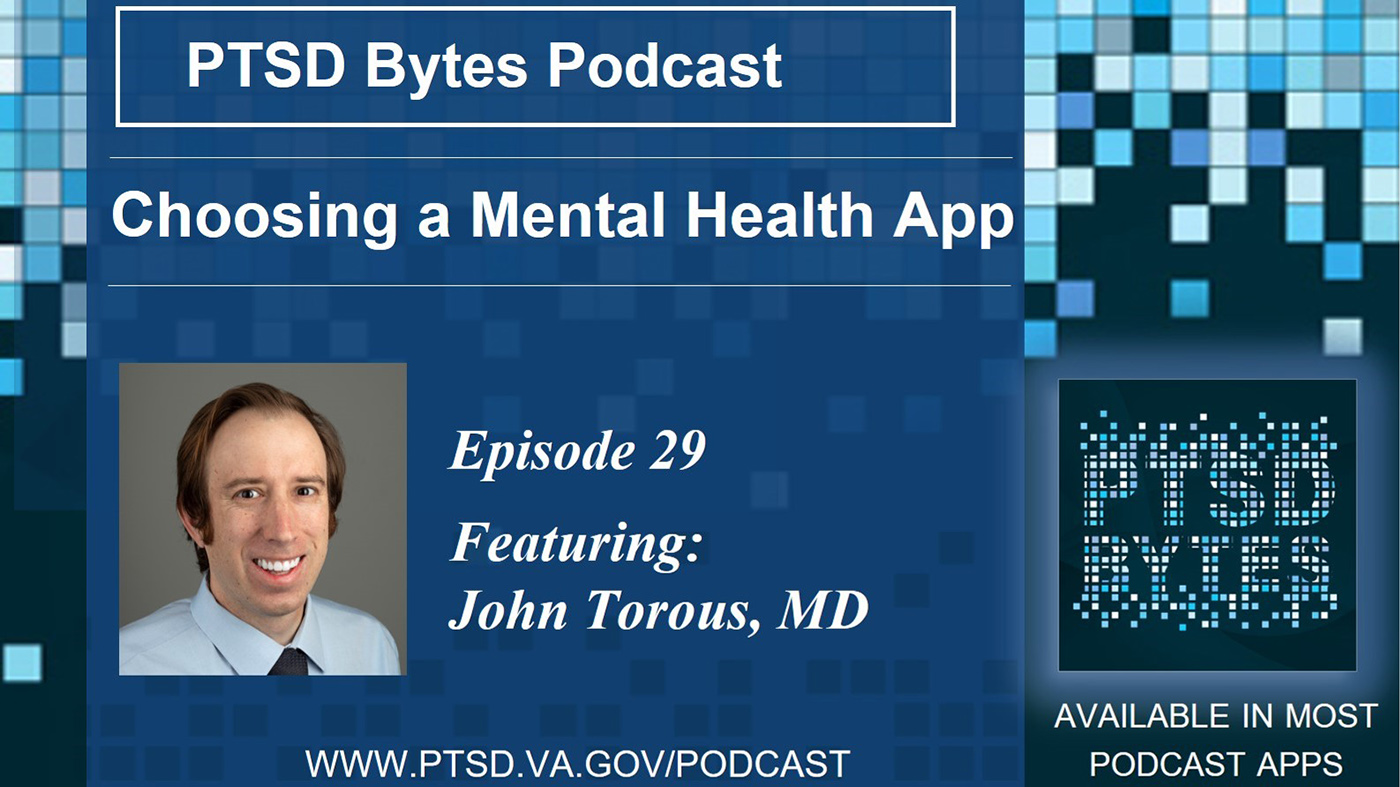In this episode of the PTSD Bytes podcast, learn how to choose a mental health app that’s best suited for you with Dr. John Torous, director of the digital psychiatry division at Beth Israel Deaconess Medical Center.
How can mental health apps help?
Mental health apps can be used in several ways such as to track your mood, medications or sleep. There are mental health apps that can be used for self-help such as apps that offer breathing exercises or soothing sounds to help relaxation. Mental health apps can also be used to support activities you’re working on in therapy.
Some apps can be used to keep in touch with or send updated information to your care team. These apps may also offer ways to practice skills and complete homework assignments in between appointments.
Mental health apps can be thought of like a vitamin for mental health care, meaning apps can supplement care but do not replace it. Because apps are supplemental, they are not regulated closely and FDA approval doesn’t mean an app is high quality.
What to look for in a mental health app?
In a fast-paced tech world, it can be difficult to choose from the thousands of mental health apps in the marketplace. Look for an app for your particular mental health needs versus choosing an app based on popularity. Torous notes, “You want to be a picky consumer and you want to find apps that are safe, that protect your data.” Since most mental health apps are considered tools for “wellness,” they’re not required to follow HIPAA privacy standards. HIPAA is a federal set of standards meant to protect one’s medical records and includes mental health information.
If an app is not required to follow HIPAA standards, “Those privacy rules are really out of the window. The app can often do what it wants to do with your personal data,” warns Torous. When choosing an app, find out if it’s evidence-based. “Evidence-based” means there is research to support what the app is doing or claiming to do. If you find an app that seems trustworthy and helpful, try it out and see if it’s engaging. You want to find an app that you would actually continue to use.
Where to start when looking for a mental health app?
One place is to start is VA’s mental health apps. Torous says he often recommends VA apps to his clients because VA mental health apps are, “Completely free, evidence-based, engaging and they’ve been well-tested.”
To help you find a mental health app that is both useful and secure, Torous and his team created a free website mindapps.org. This website can provide you with multiple search options. For example, you can search for an app based on its privacy, cost, and/or evidence-base, and the website will show you a list of apps that fit those criteria.
MINDapps is based on the American Psychiatric Association’s App Evaluation Model. The website has checklists for information you should look for when choosing an app and videos that can give you a better sense of where to start.
You can also ask your health care professional if they have any recommendations for a mental health app. They can help you think about what kind of app would best meet your needs.
Additional links:
- VA mobile mental health apps at PTSD Bytes episode #1
- Self-help and coping with PTSD
- The Division of Digital Psychiatry at Beth Israel Deaconess Medical Center
- More PTSD Bytes episodes
If you are a Veteran who is experiencing a crisis or supporting a loved one who is, call 988 and press 1 for immediate assistance, or chat online at VeteransCrisisLine.net/chat.
Topics in this story
Link Disclaimer
This page includes links to other websites outside our control and jurisdiction. VA is not responsible for the privacy practices or the content of non-VA Web sites. We encourage you to review the privacy policy or terms and conditions of those sites to fully understand what information is collected and how it is used.
More Stories
The Medical Foster Home program offers Veterans an alternative to nursing homes.
Watch the Under Secretary for Health and a panel of experts discuss VA Health Connect tele-emergency care.
The 2024 National Veteran Suicide Prevention Annual Report provides the foundation for VA’s suicide prevention programs and initiatives.







